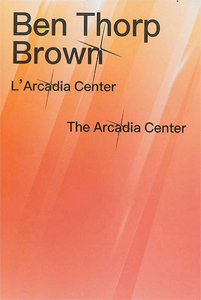Conceived as a kind of wellness center in response to the politics of our times, The Arcadia Center places architecture at the intersection between empathy, care, and survival. In this arcadian sanctuary, dwellers can enjoy an idyllic, timeless existence that encourages them to reconnect with people, animals, and the natural world. Filmed in Richard and Dion Neutra's VDL Research House II at Silver Lake Reservoir in Los Angeles, the video Cura shown in the exhibition brings to life the principles developed by the Austrian-American architect, who saw architecture as a therapeutic tool and designed projects in which each environmental element was carefully calculated to elicit sensory and emotional responses in people. Featuring a conversation between Ben Thorp Brown and Laura Herman and an essay by architectural theorist Sylvia Lavin, this publication explores empathy as a critical capacity and an expression of our perception of the spaces in which we dwell.
Published on the occasion of the eponymous exhibitions at Jeu de Paume, Paris, from June 18 to September 22, 2019, and CAPC musée d'art contemporain de Bordeaux, from June 20 to September 22, 2019.
The Satellite Programme of contemporary art exhibitions was started by the Jeu de Paume in 2007. Since 2015, this programme of exhibitions has been organised jointly by the Jeu de Paume and the
CAPC musée d'art contemporain de Bordeaux. Each programme is conceived by an internationally renowned curator (Fabienne Fulchéri, María Inés Rodríguez, Elena Filipovic,
Raimundas Malašauskas, Filipa Oliveira,
Mathieu Copeland, Nataša Petrešin-Bachelez, Erin Gleeson and Heidi Ballet). In 2019, it will also be presented at the Museo Amparo in Puebla (Mexico). Each exhibition is accompanied by a publication that was conceived as a carte blanche for the curator and artists. This series of books, each of which was created in close collaboration with a graphic design agency, forms an independent artistic space within the Satellite Programme.
The 12th Satellite Programme, titled
The New Sanctuary and curated by Laura Herman, proposes newly commissioned works by Julie Béna, Ben Thorp Brown and Daisuke Kosugi who, through their individual practices, consider the capacity of the designed environment to host, care and engage with the body and the senses. How does space determine the way we feel? Predicated on a sense of a threatening and hostile environment, one of the basic definitions of architecture is the provision of shelter and comfort for the human body. The common idea of the dwelling as a “surrogate skin” is derived from the nineteenth-century German architect Gottfried Semper, who described the animal pen, made out of woven skins and leaves, as the origin of the architectural “private” space. Today, this understanding of architecture as an enveloping spatiality seems no longer to apply. If architecture is to be reconsidered as the meeting point between different cultural references, practices, rituals, desires and needs, how can we imagine a space of sanctuary for today's world?
Laura Herman is a graduate of the Center for Curatorial Studies at Bard College in New York and holds a master's degree in Comparative Modern Literature. Laura workes as a curator at La Loge, Brussels, a space dedicated to art, architecture and theory. She is also an editor for
De Witte Raaf, a bimonthly art journal distributed in Belgium and the Netherlands. Her reviews and essays have appeared in
Mousse,
Frieze and
Spike Art Quarterly among other publications, and she has curated a number of exhibitions and events, including
Natural Capital (Modal Alam), BOZAR, Brussels;
Third Nature, Hessel Museum, New York;
Definition Series: Infrastructure, Storefront for Art and Architecture, New York; and
Wild Horses & Trojan Dreams, Marres, Maastricht.
Sylvia Lavin is an internationally known critic, historian and theorist whose work explores the limits of architecture across a wide spectrum of historical periods. Lavin is professor of architecture at Princeton University and received her PhD from the Department of Art and Archaeology at Columbia University. Her books include
Kissing Architecture (Princeton University Press, 2011),
Form Follows Libido: Architecture and Richard Neutra in a Psychoanalytic Culture (MIT Press 2005) and
The Flash in the Pan and Other Forms of Architectural Contemporaneity (AA Publications, 2015). Lavin's work as a curator includes the 2013 traveling exhibition
Everything Loose Will Land, Art and Architecture in Los Angeles in the 1970s, Exhibition Models at the 2017 Chicago Architecture Biennial, and
Architecture Itself and Other Postmodernist Myths, at the Canadian Center for Architecture, Montreal, 2019.
Ben Thorp Brown (born 1983 in New York, lives and works in Brooklyn, NY) attended the Whitney Museum Independent Study Program, and is a graduate of Williams College and the School of the Art Institute of Chicago. His recent work has been presented at the St. Louis Art Museum and in following exhibitions: Dreamlands: Immersive Cinema and Art, 1905-2016 (Whitney Museum, New York), Greater New York (MoMA PS1, New York), 24/7. the human condition (MAK – Austrian Museum of Applied Arts, Vienna Biennale) and Chance Motives (SculptureCenter, New York), as well as in film festivals such as The New York Film Festival and Rotterdam International Film Festival. He has received awards from the Creative Capital and the Graham Foundation, and was an artist in residence at the Chinati Foundation in Marfa, Texas.

